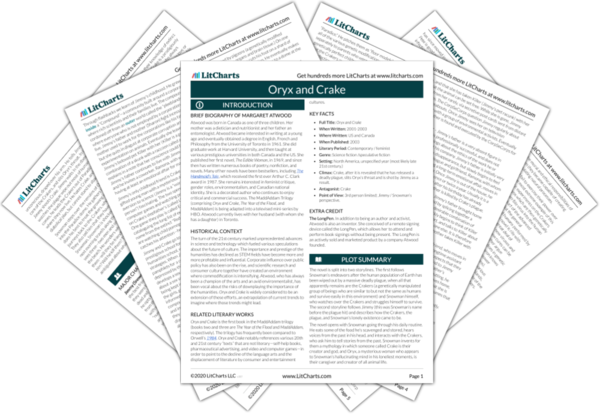The novel examines various kinds of human relationships (sexual, romantic, familial) and how they are affected by the scientific and cultural shifts taking place in Oryx and Crake’s world. Are human relationships free and safe from corporate and scientific manipulation? Are individuals still even capable of human bonding in this culture?
Jimmy spends a great deal of time in the novel seeking connection, and largely failing in achieving it. His mother has left his family for ethical reasons (taking his beloved pet with her), while his father is distant. Jimmy fills this void through his friendship with Crake, though that friendship is founded on video games and watching porn. Jimmy also seeks sex almost constantly– Crake thinks he is a sex addict – yet Jimmy rarely finds comfort in the sex he does have. His only true romantic love is Oryx, whom the novel implies may not even be a single person but rather a conglomeration of televised images of women that Jimmy has seen throughout his life, culminating in the woman that works for Crake in Paradice and with whom Jimmy has a secret sexual relationship. Jimmy’s relationships are characterizes by emptiness on the one hand and betrayal on the other, until after the plague when he is the last human left he takes on the name “Snowman,” which bears a marked resemblance to the words “no man,” implying that without any other humans with whom to have relationships that Snowman can’t be human himself.
Where Jimmy spends the novel seeking out meaningful human relationships (often unsuccessfully), Crake grows increasingly disdainful of human bonding over the course of the novel. Crake never shows any familial love for his parents, and Jimmy ultimately suspects that Crake killed his own mother and stepfather (Uncle Pete) in order to test the deadly viruses he was developing. Further, Crake thinks little of sex, seeing it in purely scientific terms as an “inelegant” solution to reproduction, and believes that love is nothing more than the painful consequence of poorly regulated hormones in the human brain. Crake seems to view everything that contributes to human relationships as messy and unnecessary, and tries to eliminate that messiness. With the Crakers, Crake tries to breed out sex and romance entirely, turning copulation into an infrequent and purely reproductive activity, so that sexual frustration and betrayal is eliminated, as is overpopulation. The only exception to Crake’s rejection of sex and romantic love is Oryx, the first woman Crake has ever had any affection for. Yet Oryx finds sex with Crake to be mechanical and impersonal, and conducts a secret affair with Jimmy. It is suggested that Crake knew about the affair, though it is unclear the extent to which Crake’s actions in his final months of his life (releasing the plague, killing Oryx) are a result of her affair and his unrequited love for her.
The novel thematically wonders how human relationships will fare if rapid scientific advancements and corporate greed continue to have an increasing effect on the life of the individual. Trust, love, and bonding are hard to come by in this world, where sex and love are so often paid for, where security organizations sponsored by corporate enterprises are always watching, and where culture is so saturated with consumption and entertainment it is not clear which relationships are real and honest. The effect on the novel’s main characters is clear: Jimmy is alienated and alone and plagued by addictions, where Crake becomes maniacal in his attempt to control human relationships so completely through scientific manipulation that they cease to be relationships at all.
The State of Human Relationships ThemeTracker

The State of Human Relationships Quotes in Oryx and Crake
There are a lot of blank spaces in his stub of a brain, where memory used to be.
“Leave Daddy alone,” said his mother. “Daddy is thinking. That’s what they pay him for. He doesn’t have time for you.
“We give people Hope. Hope isn’t ripping off!”
“At Nooskins’ price it is. You hype your wares and take all their money, and then it's no more treatments for them…Don’t you remember the way you used to talk?...you had ideals, then.”
[…] “There’s nothing sacred about cells and tissue.”
On some non-conscious level, Snowman must serve as a reminder to these people, and not a pleasant one: he’s what they may have been once.
But love was undependable, it came and then it went, so it was good to have a money value, because then at least those who wanted to make a profit from you would make sure you were fed enough and not damaged too much.
Crake thought he’d done away with all that…God is a cluster of neurons, he’d maintained…They’re up to something though. Something Crake didn’t anticipate. They’re conversing with the invisible. They’ve developed reverence.
Sex is no longer a mysterious rite, viewed with ambivalence or downright loathing, conducted in the dark and inspiring suicides or murders. Now it’s more like an athletic demonstration, a free-spirited romp.
How could I have missed it? Snowman thinks. What he was telling me? How could I have been so stupid?...
There had been something willed about it, though, his ignorance…he’d grown up in walled spaces, and then he’d become one. He had shut things out.
From time to time he looks over his shoulder. The smoke is still there, just one column of it. It hasn’t spread. It keeps on rising.
Here are Crake and Oryx, what’s left of them. They’ve been vulturized, they’re scattered here and there, small and large bones mingled into disarray…He’s grinning with all the teeth in his head. As for Oryx, she’s face down, she’s turned her head away from him as if in mourning. The ribbon in her hair is as pink as ever.
“We made a picture of you, to help us send out our voices to you.”
Watch out for art, Crake used to say. As soon as they start doing art, we’re in trouble.











